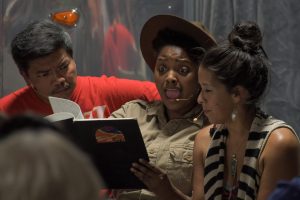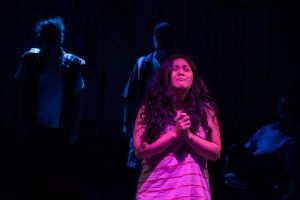
L-R Sharmaine Ruth as Olivia & Sarah Zimmerman as Beatriz – Courtesy of Ben Rose. Used with permission.
During his 40 years as a producer, Bryan Fonseca has always had his ear to the ground when it comes to social issues and timely, controversial subject matter that others have ignored or shied away from. And specifically, when it comes to people of color and other marginalized groups, he has always been in the vanguard of not only telling their stories, but also casting them in his shows and significantly involving them behind the scenes. Now, the fearless trailblazer can vehemently follow his passion as founder and producing director of Fonseca Theatre Company. The theatre celebrated its one-year anniversary with the opening of “Miss You Like Hell,” a musical by Quiara Alegría Hudes, which I attended on Friday.
Directed by Fonseca, “Miss You Like Hell” with book and lyrics by Hudes (who also wrote the book for “In the Heights and “Water by the Spoonful,” for which she won a Pulitzer Prize) with music and lyrics co-written by Erin McKeown, premiered at La Jolla Playhouse in California in 2016 and had its Off-Broadway opening in NYC at The Public Theater in 2018. A dramedy, the play tells the story of a disaffected and troubled teen girl, who goes on a cross-country road trip with her undocumented, immigrant mother, from Mexico.

Sarah Zimmerman as Beatriz. Courtesy of Ben Rose. Used with permission.
Following the example of NoExit Performance, celebrated for its innovative site-specific productions, FTC is staging the show in a large warehouse-like facility owned and operated by The Kinney Group, right across the street from the theatre’s future new home at 2508 W. Michigan Street. In so doing, Fonseca and company took on an ambitious feat that was one of the most unique theatrical productions I have ever witnessed in my many years of reviewing. With the audience seated in quadrant sections and a main playing area in the center of the huge space, surrounded by multiple playing areas on the periphery and one for a six-piece band, the audience is required to turn in one of the provided swivel or stationary chairs to follow the action.
With that unique staging in such a gargantuan space comes a host of lighting and sound challenges. Unfortunately, on opening night, a lot that could go wrong did, resulting in a valiant struggle on the part of the FTC crew to overcome a host of problems that plagued the show. They included sound glitches and lighting system malfunctions that even caused a brief blackout. However, the audience, which was very forgiving and good sports, didn’t seem to mind, nor did I. Not one actor lost his or her concentration and handled the crises with thorough professionalism. In the end, it was all just a reminder that anything can happen in live theatre. The good news, as I have since discovered, is that all those pesky tech problems have since been resolved.
As I write this review, U.S. Immigration and Customs Enforcement (ICE) raids are taking into custody undocumented criminals in some major American cities, while thousands of undocumented immigrants from Central America are languishing in dehumanizing conditions in U.S. detention centers. In “Miss You Like Hell,” the main theme is the immigration debate.

L-R Ian Cruz, Bridgette Ludlow & Sarah Zimmerman – Courtesy of Ben Rose. Used with permission.
In the play, 40-something Beatriz (Sarah Zimmerman), who has lived without documentation in the U.S. for 20 years, is in danger of deportation. As the play begins, she shows up in Philadelphia, outside the window of her estranged 16-year old daughter Olivia (Sharmaine Ruth), whom she lost in a custody battle eight years earlier to the girl’s white American father. Convincing Olivia to join her in her rundown pick-up truck on a week-long, cross-country trip to California, Beatriz tells her that she is deeply concerned for her, having read some inferences about suicide on her daughter’s blog and is sincerely hoping for some mother-daughter bonding. What she doesn’t tell her is she has an ulterior motive. She desperately needs Olivia to testify as a character witness for her in an upcoming immigration hearing in L.A.
Besides immigration, the script covers multiple topics, such as depression, suicide, parental absence, cyber-relationships, and cultural identity. I found it entertaining, often touching, yet underdeveloped and predictable as American road trip stories go. Along the way, Beatriz and Olivia encounter a retired gay couple, Mo (Paul Hansen) and Higgins (Patrick Gross), two bikers on a romantic mission to break a record, and Manuel (Ian Cruz), a widower who sells tamales. They also take a side trip to Yellowstone National Park to visit Pearl (Bridgette Ludlow), a park ranger who is Oliva’s biggest blog fan. The journey takes a bad turn when Beatriz is arrested in a routine traffic stop and her immigration lawyer (Yolanda Valdivia) must intervene.

Bottom L-R Sarah Zimmerman & Sharmaine Ruth Top L-R Bridgette Ludlow, Patrick Goss and Ian Cruz. Courtesy of Ben Rose. Used with permission.
What appealed to me most about the show, aside from the uniqueness of the unconventional setting, were the performances that, for me, were the main attraction. Zimmerman excelled in her role as the free-spirited, direct and often profane Beatriz. Ruth served as the combative foil to her manipulative mother as sullen, bookish, petulant Olivia. Showing believable chemistry in their characterizations of the constant dueling mother and daughter, the two actors also turned in superlative vocal performances as well. Both unknown to me prior to this show, I hope to see them again in other productions.
As far as the play’s supporting characters, Ludlow turned in a fine performance as the sunny park ranger Pearl and showed off a voice blessed with an appealing tone, charisma and acting that was distinctive for its natural quality.
Also conveying convincing chemistry, and showing comic expertise were Hansen and Ross as the gay couple who befriend Beatriz and Olivia and try to help Beatriz get out of jail. Other members of the cast in ensemble roles are, Paige Scott, Dan Scharbrough and Camila Ferrera.

Sharmaine Ruth as Olivia – Courtesy of Ben Rose. Used with permission.
Led by Fonseca’s long-time collaborator Tim Brickley, the show’s music director and guitarist, the band showed accomplished musicianship playing McKeown’s pleasing, yet pedestrian folk-rock score. A few songs that were endearing included “Tamales,” which really spoke to me and brought back memories of my Mexican-American mother who made them every Christmas Eve and “Yellowstone” sung beautifully by Ludlow. Moving me and speaking to the injustice being perpetrated by government persecution and harassment of undocumented immigrants was “Over the Shoulder” sung powerfully by Zimmerman.
Following the performance, there was an outdoor reception to celebrate the FTC’s first birthday, after which I joined a group of supporters for a tour of the organization’s new home across the street from The Kinney Group. Visible were frames for the walls, risers and stage for the 80-seat theatre in the intimate, urban, exposed-brick space that reminded me of Broad Ripple Playhouse, which is where Fonseca first directed and where I met him after he arrived in Indy. Seeing the show and visiting FTC’s new space was inspiring and excited me greatly that our community will have the opportunity to hear new voices, plus be exposed to new ideas and see faces that truly reflect the diversity of our city.
Generous arts patron, community leader and long-time Fonseca supporter Frank Basile, who attended the show and was also on the tour, said to me, “Bryan doesn’t give just lip service to multicultural productions, but actually makes them happen.” Amen.
For tickets and information regarding “Miss You Like Hell,” which runs through July 28, visit fonsecathreatre.org.





